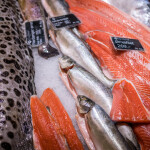The use of antibiotics to control disease in farmed animals, whether on land or at sea, has always been a somewhat controversial practice. Evidence of antibiotic-resistant bacteria in humans is emerging, and many
The issue came to a head last
The amounts reported last summer, Forster said, might not be so crazy if farmers were raising chickens or other animals, but “it’s a lot for salmon.”
The main push for their use in Chile, he said, comes from Salmonid Rickettsial Septicaemia (SRS), a disease that threatens some salmon stocks, particularly coho salmon, which is a common species grown in Chile. Antibiotics can
“They’re not using anything off-label as it were, but the amount is excessive,” he said.
Antibiotics, Forster said, should never be used as a long-term solution to a problem. If the farmers want to fight SRS, he said, they need to find a vaccine for the disease, which researchers in Chile are “intensively” working on right now.
Once that happens, he said, use of antibiotics will drop dramatically there. Elsewhere in the world, he said, there is less pressure to use them, not to mention strict rules about when and how and even who can order their use.
“In most of the countries producing salmon it’s working pretty well,” he said.






